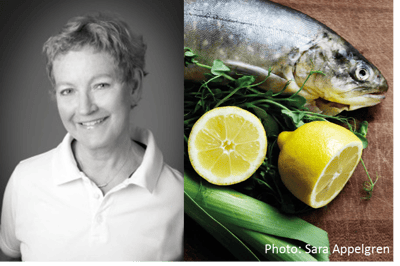It could be said in one sentence: The most important for your health and well-being (within your own control) is regular exercise, good sleep, varied food, daily routines, pauses for rest and relaxation, socializing with people you like and moderate alcohol intake. And still it can be so hard to live by…
This advice goes for everyone, regardless if you have a disability or not. But with a physical disability your lifestyle is even more important.
That’s why we asked the Spinalis foundation, the true experts on living with a Spinal Cord Injury, for guidance!
Anna-Carin Lagerström is a physiotherapist, MSc, health educator, nutrition counselor and Spinalis’ own health coach. She is a specialist in helping people with spinal cord injuries and talks about the importance of good habits for a life with more energy and quality.

Daily routines
Anna-Carin promotes the simple fact of living your life in daytime.
“There is actually a correlation between overweight and going to bed in the early hours”, Anna-Carin says.
“Night time is the worst for giving into temptation in terms of snacks, candy, alcohol and cigarettes.”
Most friends and family have a more classic daily rhythm—they are awake in daytime and sleep in nighttime—so eventually the nightlife can affect the social life as well. Some miss appointments with their physiotherapist or other healthcare professionals, or just miss out of fun and good things, by not showing up.
“You need a good structure during the day to create conditions for a healthy life. It is difficult to get up in the morning if you don’t have routines that force you to do that”, Anna-Carin says.
Food quality
Food quality is another subject close to her heart. She talks a lot about the downside of processed food.
The term ‘processed food’ applies to any food that has been altered from its natural state in some way, but in daily speech we often mean industrially processed foods with a reduced nutritional value. Most often processed food contains preservatives, unhealthy fat, added salt and sugar, and is lacking in fiber.
“Real food—nutritionally dense food—is the key to good health”, Anna-Carin says. “Processed food causes cravings and over-eating. You don’t feel full, or you temporarily feel full but it doesn’t last, so you eat more and more often. It is a reason for overweight, as well as constipation, which many people in wheelchairs suffer from“, Anna-Carin explains.
Exercise
Physical activity and exercise, based on your physical condition, is also vital for your health. A life in a wheelchair offers a lot of challenges where you need a strong body.
“It’s like brushing your teeth—it is absolutely essential to do it every day. The same goes for exercise, especially since you miss out of the regular daily exercise that walking people get automatically”, Anna-Carin says.
But it’s extra important to exercise smart, and based on your own circumstances.
“Training to hard can cause pain and that might result in problems in the bathroom, when performing CIC or TAI, or handling hygiene. You should avoid muscle soreness since you are so dependent on your shoulders to be able to move around”, Anna-Carin says.
Ask your physiotherapist for a suitable program. If you have pain, in addition to your usual pain, more than a couple of days, you should see a doctor.
To dig deeper into the health theme, click the button and read Anna-Carin Lagerström's 10 Best Tips for Good Health!
About Spinalis
The Spinalis foundation is a charitable foundation whose mission is to promote research and treatment development in the field of spinal cord injuries, and we at Wellspect are happy to be partners with Spinalis in many research projects.




